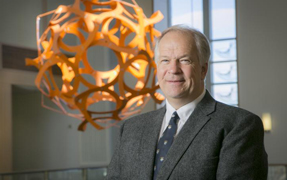Earth Angel: Chris Fisher's latest expedition
LiDAR captures a decade's worth of archaeological research in 45 minutes.

In 2009, Dr. Chris Fisher, professor of anthropology and archaeology at Colorado State University, was mapping an ancient city in Mexico's Lake Pátzcuaro Basin at the rate of about one square kilometer per year with, he then estimated, about nine square kilometers to go. "It was a career-long venture," he told the audience at the SPIE Fellows Luncheon at Optics + Photonics where he was the keynote speaker, "but I was impatient." He consulted with a geography colleague who pointed him toward LiDAR, then an emerging technology in archaeology.
Intrigued, Fisher invested in LiDAR, imaging what he thought were the remaining nine square miles of his excavation site. As he perused the data, he almost started crying: in just 45 minutes of flying time, LiDAR technology had captured more than a decade's worth of archaeological research. Continued use of LiDAR revealed not 10 but 26 square kilometers of foundations hidden under miles of neotropical forest.
"LiDAR represents a paradigm shift for archaeology and for many other sciences," said Fisher. "These LiDAR records are comprehensive conservation records. They record the earth's surface in incredible detail, and it is my hope that in 50 or 60 years, maybe longer, people will be going back through these records with new technologies and new ways of analysis, learning new things about the earth and understanding global change."
Fisher's most urgent focus? Earth Archive, a comprehensive, high-resolution, 3D mapping of our planet: between, for example, deforestation and natural geographical changes, "things are disappearing as we speak. We have to collect this data now," he says. "And light-based technology is what makes this happen."
Keep up with his research on his website: http://www.chrisfisher.science/
| Enjoy this article? Get similar news in your inbox |
|



